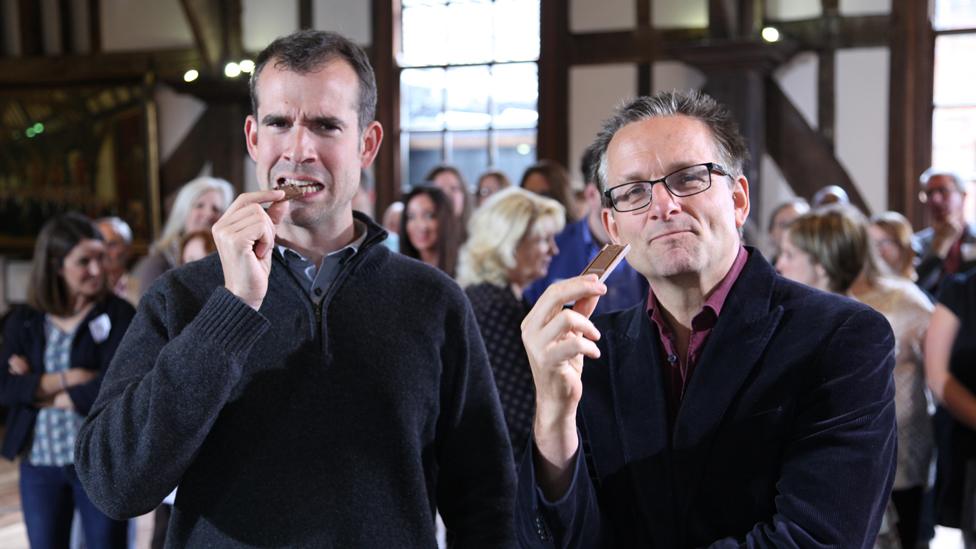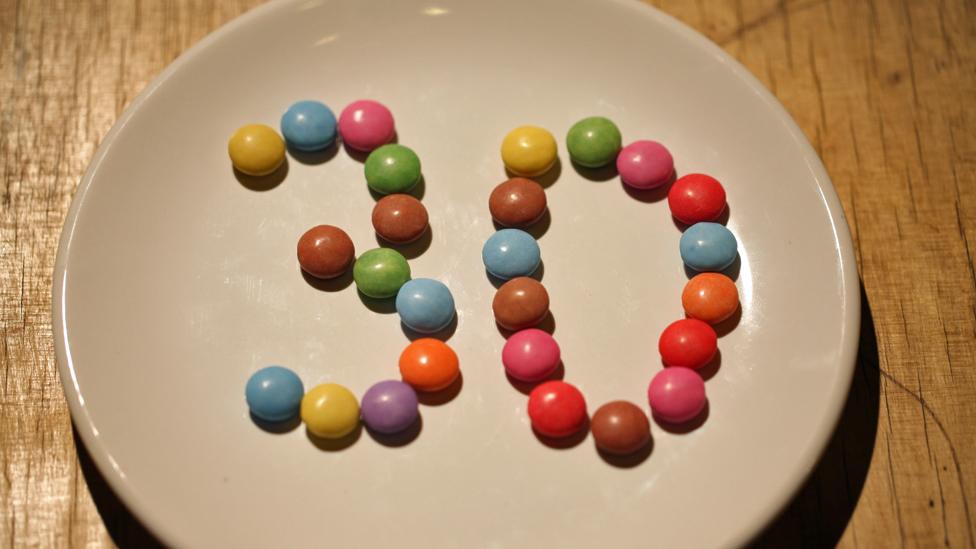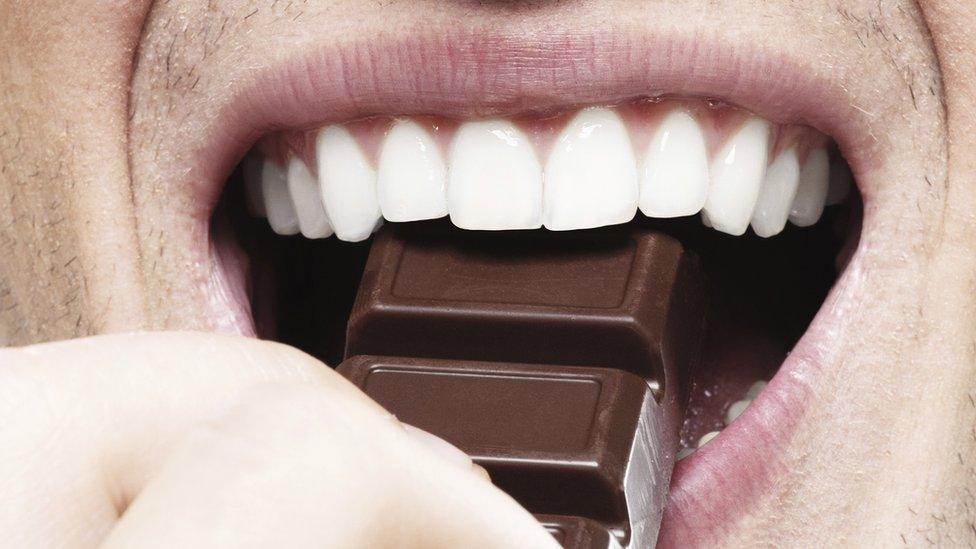Can people learn to curb their chocolate cravings?
- Published

Can you really cut your cravings for chocolate by pretending to eat it? Michael Mosley has been finding out.
I have a confession to make. I am addicted to chocolate. I have tried giving it up many times, and failed. My daughter has never forgiven me for eating her Easter egg when she was just eight years old.
The trouble is, it was lying there on the kitchen table, already open, calling to me. I thought I would just take a small nibble, and she would never notice. Then I took another, bigger nibble. Then the egg was gone and I was caught with chocolate-y smears around my mouth. I felt guilty. I was guilty.
We are a nation of chocoholics, eating around 11kg of chocolate a year, one of the highest rates in the world. We know that the combination of fat and sugar is bad for us, but can't resist. Knowing it's "bad" may even be part of its allure.
Many people, I'm sure, are happy to keep on munching. But what can you do if you really, really want to quit, or at least cut back?
The Trust Me, I'm a Doctor team decided to find out. We invited more than 200 chocolate enthusiasts to take part in a counter-intuitive experiment, the brainchild of Prof Carey Morewedge from Boston University.
It was not only counter-intuitive but also rather tricky because we couldn't tell the volunteers what we were going to do to them. That might have altered their behaviour and spoiled the results. All we could tell them is that it would involve eating chocolate.
Once they had all gathered at the Merchant Adventurers Hall in York we divided our volunteers into two groups.
The first group were asked to imagine eating 30 chocolates, one at a time. They couldn't mentally stuff the chocolate into their imaginary mouths in imaginary handfuls, but had to think about slowly chewing them one by one. This took quite a long time.
The second group had to do the same thing, but they had to imagine eating just three chocolates.
Once they'd done this we asked everyone, separately, to fill in a complicated form. But here's the sneaky thing - we weren't interested in what they wrote on the form. We really wanted to see how much they ate from the bowls of chocolate we had left casually on the table where they were filling in their forms.

The volunteers had no idea that they were being monitored. Prof Morewedge was betting that the group who had just been asked to imagine eating lots of chocolate would eat less. The more they had imagined and mentally savoured, the less they would actually scoff.
And he was right. The group that imagined eating 30 chocolates ate 37% less than the group that imagined eating three. It was a striking finding but one we decided to keep to ourselves until the end of part two of the experiment.
So what's going on? I would have thought that the best way to avoid eating chocolate is to avoid thinking about it or having it around. We have none in our house (and if the kids have some they now know they have to hide it).
"That intuitively seems to make sense," says Prof Morewedge, "but when we try to avoid something or try to stop thinking about something, immediately you start thinking about that thing. I say 'don't think about a white bear' and you will start thinking about white bears."

Try not thinking about chocolate
When people try to suppress thoughts it tends to activate them, so rather than fight the craving for chocolate Prof Morewedge thinks you should force yourself to repeatedly think about tasting, swallowing and chewing the food you crave. This should lead to what's called "habituation". It's like when you eat a big bar of chocolate - the last square is never quite as delicious as the first.
His theory is an interesting one, and it certainly seems to work in the short term in laboratory situations, external or artificial set-ups, like our testing day .
But can it really be used as a routine craving-beating technique in the real world? That has never been tested before.
To find out we sent all our volunteers home with a large bag of chocolate. Every time they felt like eating some of the chocolate we asked them to do the same imagination task they had just done. Those in the first group had to imagine eating 30 chocs - and in the second group three chocs.

So how did they get on?
This time we were interested in seeing what effect this process had on their cravings. So when the two groups came together again we got them each to fill in a questionnaire, which this time we were interested in.
Although it didn't work for everyone, on average the group who had practised "imagine eating 30 bits of chocolate" reported having less cravings for chocolate than the other group who only had to imagine eating three.
As one of our volunteers put it: "By the time I'd finished imagining the 30 pieces I really wasn't that bothered about eating lots of real chocolate. I normally can't leave an unfinished bar, but I can after this. I need to lose some weight - so I plan to try this approach with other foods, because it obviously worked for me."
There is evidence that this approach can work for other cravings (it's been used to curb a longing for cheese, as well as chocolate) and it would be interesting to see it tried on more serious addictions, such as tobacco or alcohol.
So next time you crave something you think you shouldn't - try just imagining having it - 30 times.

Chocolate in the Magazine


Trust Me, I'm A Doctor continues on BBC Two at 20:00 BST on Wednesday 29 July - or watch on BBC iPlayer
Subscribe to the BBC News Magazine's email newsletter, external to get articles sent to your inbox.